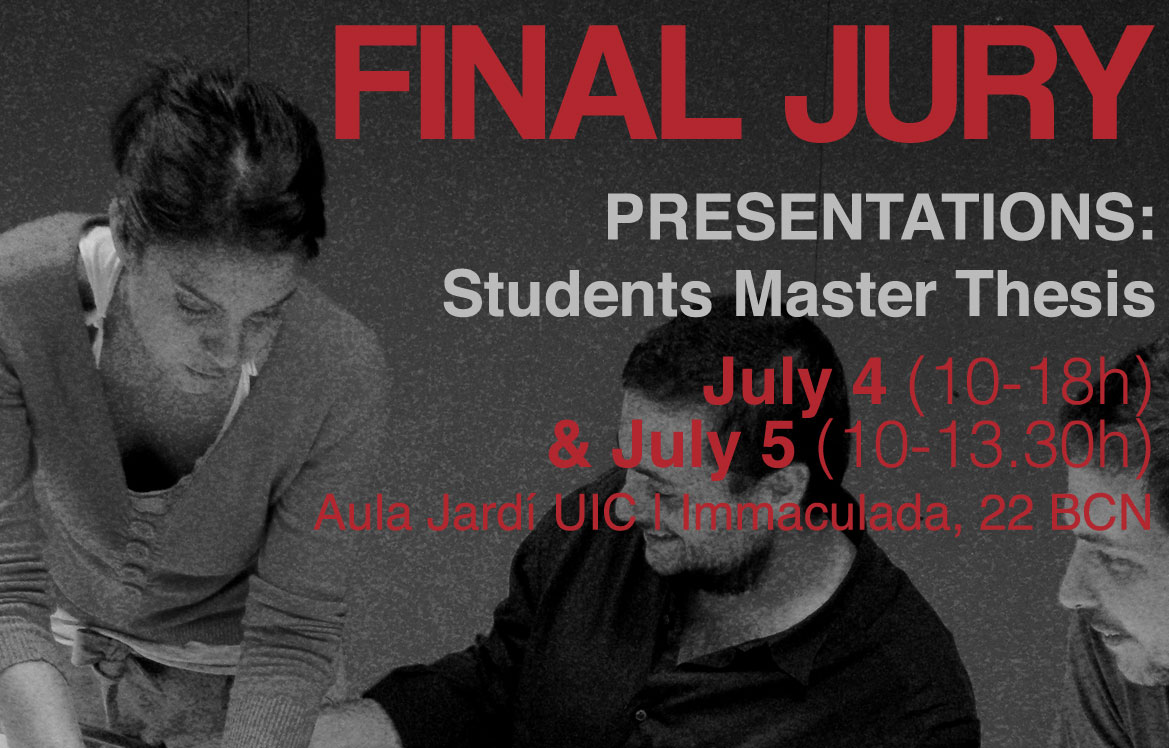 The Final Jury brings the 2010-2011 edition of this masters course to a close, an event in which students will present their thesis projects and which we hope will serve as a platform for debate between students and scholars.
The Final Jury brings the 2010-2011 edition of this masters course to a close, an event in which students will present their thesis projects and which we hope will serve as a platform for debate between students and scholars.
We trust the research carried out by this group of 14 students within the framework of the Master of International Cooperation at ESARQ-UIC, raises a diversity of pressing contemporary issues and has the potential to become a valuable contribution to the following fields of study: community “agency” in urban regeneration processes in human settlements, reconstruction process of communities affected by catastrophes, risk reduction, role of urban planning and design, and social housing and cultural heritage.
The Final Jury is open to the public, so please join us for some interesting discussions and to support the work of our students!
Check the poster for info on location, times and jury members.
Here is a list of the thesis being presented:
Reviewing International NGOs Architecture to Promote Sustainable Development. The case study o fan International cooperation school cum cyclone shelter Project in a rural village in the region of Orissa, India
Student: Uriel David Aboim
The role of architectural cultural heritage in postwar recovery. Case study: Bosnia and Hercegovina (city of Mostar)
Student: Alma Varatanovic-Guso
The Architecture of Humanitarian Aid in post-disaster contexts. From donations to project Implementation: a different perspective
Student: Alberto Preato
Dimensions within the reconstruction process. Reflections and considerations on the general reconstruction process guidelines and its different dimensions, physical and social
Student: Pedro Salavessa
Appraisal of the effects of non reforming policies. Housing development in a new planned city, Naya Raipur, India
Student: Rajesh Rajasekharan
Bridging the formal-Informal divide in Brazil. The special zones of social Interest in the strategic Master Plan of Sao Paulo
Student: Greta Sanches Correa
Development thinking & community involvement during post-disaster housing reconstruction in develop(ed)/(ing) countries: the case of Sri Lanka & new Orleans
Students: Maarten de Cock
Stakeholder-driven housing redevelopment. An situational analysis of Barangay Rizal, Metro manila, Philippines. Input for the Risk-Sensitive Urban Redevelopment Plan/Project (RSURP)
Student: Janae Futrell
Urban Planning and design in Dadaab Refugee Camps
Student: Nicolas Carcelén
Living in the edge. How to avoid urban sprawl over risk prone areas. Case study: Slopes of the surrounding mountain chain of Lima
Student: Jose Luis Chong
The politics of the material. Building materials decisions, Resourcing & Implementation in the post-disaster Haiti
Student: Faidra Matziaraki
Approach towards Sustainable Management of Watershed areas in Dry climate conditions
Student: Rossana Poblet
Measuring the Impact. The process of modelling affordable and sustainable early childhood development centers in Rwanda
Student: Nerea Amorós Elorduy
The neighborhood Improvement integral plan – PMIB- as an urban integral project in the frame of the risk management for reduction of landslide risk in informal settlements. The Medellin case 1993-2011
Student: Elkin Dario Vargas Lopez


dear sir,
i am student of architecture in cecos university peshawar pakistan .my thesis project is architecture for humanity.plz send me (The Architecture of Humanitarian Aid in post-disaster contexts) report.
muhammad shahid
cecos university peshawar pakistan.
mshahid_340@yahoo.com
hi.i am from India doing my M.Arch. i found this topic titled
“Living in the edge. How to avoid urban sprawl over risk prone areas. Case study: Slopes of the surrounding mountain chain of Lima” interesting. can you just share the goals and objectives behind this research..can some policy work on government level before time can control urban sprawl? im just curious to know how you cope up with this topic..
waiting for you response
Best regards,
Ammarah